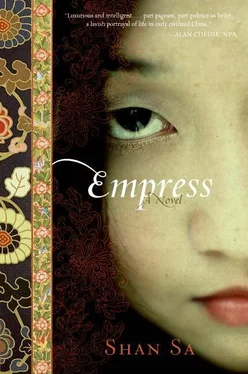Shan Sa - Empress
Здесь есть возможность читать онлайн «Shan Sa - Empress» весь текст электронной книги совершенно бесплатно (целиком полную версию без сокращений). В некоторых случаях можно слушать аудио, скачать через торрент в формате fb2 и присутствует краткое содержание. Жанр: Историческая проза, на английском языке. Описание произведения, (предисловие) а так же отзывы посетителей доступны на портале библиотеки ЛибКат.
- Название:Empress
- Автор:
- Жанр:
- Год:неизвестен
- ISBN:нет данных
- Рейтинг книги:5 / 5. Голосов: 1
-
Избранное:Добавить в избранное
- Отзывы:
-
Ваша оценка:
- 100
- 1
- 2
- 3
- 4
- 5
Empress: краткое содержание, описание и аннотация
Предлагаем к чтению аннотацию, описание, краткое содержание или предисловие (зависит от того, что написал сам автор книги «Empress»). Если вы не нашли необходимую информацию о книге — напишите в комментариях, мы постараемся отыскать её.
Empress — читать онлайн бесплатно полную книгу (весь текст) целиком
Ниже представлен текст книги, разбитый по страницам. Система сохранения места последней прочитанной страницы, позволяет с удобством читать онлайн бесплатно книгу «Empress», без необходимости каждый раз заново искать на чём Вы остановились. Поставьте закладку, и сможете в любой момент перейти на страницу, на которой закончили чтение.
Интервал:
Закладка:
This sanctification had marked the high point of a cycle that would, inevitably, fall into decline. The ascent of Tai Mountain had given me strength, but it had left my husband somehow damaged. Like a warrior who has won his victory or a poet who has written his most inspired odes, he decided to renounce speech and actions for silence and contemplation.
Since my niece’s death, my husband no longer had a favorite. When he honored my bedchamber, it was to find an older sister’s consolation in my arms. As he aged, his distress took the form of fits of mysticism. His health was failing: As well as the frequent migraines, he suffered from arthritis and chronic dysentery. He spent more and more time confined to bed, and his absence became the norm for the outer court.
During the audience, he resigned himself to playing a symbolic role in the morning salutation and let me lead political debates from behind the gauze screen.
He dedicated himself to his passion for medicine, he built up a huge pharmacy in his palace and would go to sleep surrounded by the smell of bitter herbs. He actively oversaw the compiling of an encyclopaedia of medications and even went so far as to receive herbalists and sorcerers to discuss the beneficial effects of plants. His fascination for alchemy and immortality pills was long-held, and he became fervent in these obsessions. He had altars and magic furnaces built. Like the First Emperor and the Martial Emperor of the Han dynasty, he dreamed of transmuting the body into pure spirit. The red cinnabar that he took failed to cure his illnesses, but it changed his personality. He was sometimes sleepy and sometimes feverish, sometimes full of dreams and sometimes despondent; his days of dejection were punctuated by periods of hyperactivity.
He now slept with adolescents, both boys and girls. According to Taoist medicine, their virginal bodies could rebalance his vital fluids and restore his vigor. In his search for cures, he dragged the Court on journeys with him. New cities were built. Up in the mountains, our palaces snaked between the clouds. As he listened to monkeys howling, tigers roaring, and birds chattering, his earthly sufferings were washed away. He was dazzled by tall waterfalls tumbling from rocky peaks and by rainbows hovering over ancient trees. He bathed in hot springs and explored deep caves and underground rivers, already tasting the indolent existence of the gods.
The years were flying by. Our bodies aged, and our souls trembled. I watched, powerless, as my husband drifted in the opposite direction from myself. He became slow while I remained alert; he became fragile while I remained robust. He was frequently indisposed, and I had never even experienced a migraine. His voice was weak and breathless, mine loud and full of energy. The heir, Splendor, was only sixteen years old when he was designated as regent, so I had to take responsibility for all affairs of State. I would rise when it was still dark, come summer or winter, to receive the salutation of officials that was set at daybreak by the ancestral calendar. As my husband weakened, my authority increased further. Ten years earlier, the Palace intrigues and the complexity of imperial decisions had irked me and I had sometimes felt oppressed by the impotence of power. Now, the government that I had appointed was proving its competence and obedience, and I had acquired all the assurance of a woman on the threshold of maturity. The art of commanding became a martial drill, a religious sacrifice. I was both involved and detached as I manipulated the opinions, vanities, and ever-changing truths of men.
I floated above this sullied world like a drop of oil in water.
The sovereign’s mania for traveling upset the smooth running of the Court, which sought discipline and routine. The work undertaken to satisfy his whims required hundreds of thousands of laborers. Mountains were razed to the ground, and entire forests fed the furnaces used to fire imperial bricks. Precious woods, alabasters, granites, and exotic plants arrived down the rivers and were then transported on carts drawn by oxen and horses. Having imposed restrictions on the people for the sake of the economy, I was annoyed to see my husband setting such a poor example with his profligacy. As he lost interest in politics, he became increasingly fanatical about war: He went from one province to another, visiting garrisons, reveling in their grandiose military displays. The subtle balances I had maintained within the Empire were upset by his impulsive decisions and his obsession for interpreting any kind of attack as a personal affront to his pride-which he now confused with the dignity of China itself.
The deep discord between us triggered a violent argument: Irritated by the severity of my comments to him, the Emperor shook with rage from head to toe and accused me of crossing him with the sole intention of making him unhappy. When I saw the tears on his cheeks and the pain he was enduring from an excruciating headache, I regretted giving full vent to my feelings. How could I forbid an ailing man from proving his power with military deployments? How could I deprive an already weary soul of his futile but precious earthly pleasures? How could I stand in the way of a weakening man tasting the last joys of this life?
At forty two I had brought a daughter into the world; she was called Moon and was given the title of Princess of Eternal Peace. After the birth of the daughter I had so longed for, we had brought an end to our sexual relationship. The sovereign still occasionally showed some enthusiasm for me, but I knew that his doctors had forbidden him from spilling his vital sap, and I myself no longer had any right to desire. The tormented love that I had felt for the only man in my life disappeared, and long-held resentments resurfaced. A bitterness mingled with disappointment secretly overran my heart. I was sad to see him turn his back on a vast empire and a glorious heritage for the sake of his own well-being. I had hoped that, as time passed, he would become a great sovereign, but he had proved to be full of fears and laziness. There were still days when I was moved by his helpless charm and his affable kindness, but there were others when his capricious moods and his selfish longings infuriated me. I disguised my growing weariness with him by lavishing him with affection and attention: I tended to his aches and pains, found new distractions for him, and made sure that I could devote time, patience, and maternal love to him.
I was drowning in the waves of daily life. The caravans and imperial parades snaked through the four seasons between Heaven and Earth. Clothed in green, red, yellow, then white, the trees were resplendent and then withered; flowers exploded and then fell silent. Day after day, night after night, the role of Empress became a full-time occupation, and the discipline I had imposed on my existence wrapped itself around me. I myself had made the chains that bound me, and I headed toward death with open eyes and a dry heart.
An unusually hard drought followed by a famine ravaged the Central Plain. Overwhelmed by the suffering and sorrow of the people, I decided to take on the anger of the gods myself: Considering myself unworthy of my position, I offered my abdication.
MY HUSBAND REJECTED my request, and the Outer Court, in a state of panic, signed a petition begging me to remain on the throne. In the first year of the age of the Supreme Element, Little Phoenix took the title of Celestial Emperor offered by the Court, and during the course of the ceremony, he conferred on me the golden blade and seal of the Celestial Empress. The fine gauze behind the throne that screened my seat was removed, and in palaces where receptions were held, two thrones now stood side by side. Up in the heavens, the stars foretold a luminous future for me, and yet, I could see only shadows.
Читать дальшеИнтервал:
Закладка:
Похожие книги на «Empress»
Представляем Вашему вниманию похожие книги на «Empress» списком для выбора. Мы отобрали схожую по названию и смыслу литературу в надежде предоставить читателям больше вариантов отыскать новые, интересные, ещё непрочитанные произведения.
Обсуждение, отзывы о книге «Empress» и просто собственные мнения читателей. Оставьте ваши комментарии, напишите, что Вы думаете о произведении, его смысле или главных героях. Укажите что конкретно понравилось, а что нет, и почему Вы так считаете.





